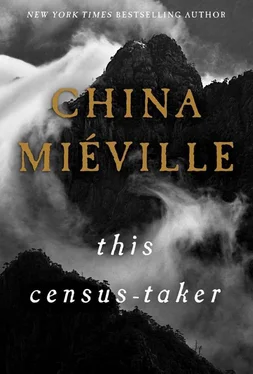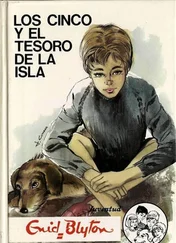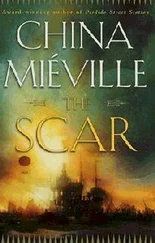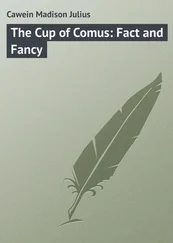“Maybe it was the police,” she said. “He kept telling them to take your father. Maybe they took him instead.”
“What about his friend?” I said. “He was waiting for someone in the picture-house. Not just you, I mean. Someone not from the town.”
She inclined her head.
“When we went back to that hall,” she said, “when your father took you, someone had been there and took everything away except what Drobe had.” I remembered him holding that sealed packet we couldn’t read.
“You know everyone in the bridgetown,” I said. “Who did it?”
“I don’t know. I never saw Drobe’s friend, either, the girl he told you about.” She paused. “Whoever it is has come to town now, they find you, you can’t find them—.” Her voice was low.
She looked away from me. “I can’t come back for a bit,” she said.
I didn’t answer. Just watched her and tried not to let my lips quiver.
She told me she had the others to think of too, especially now. “It ain’t like I could keep coming back,” she said as if I was arguing with her. “And it ain’t like Drobe’s coming back.”
She gave me a knife with a blade that folded into its handle. “If he comes for you,” she said. She stabbed the air to show me.
She told me a few quick stories.
“I wanted to give you those papers,” she said at last. “The ones Drobe found.”
“Why?”
“You can read, can’t you? But if he still had them he must have took them with him.”
She hesitated. She eyed me and I persuaded her to say whatever it was that I could tell she wasn’t sure whether to say.
“There was a woman,” she told me. “Or a girl.”
Days after Drobe had gone, days since she’d seen him. Late in the evening, Samma standing looking out of the window of her second-favorite bridge-top house as if to discern where he’d gone. She’d fallen back in shock as a face swooped in to stare at her from the dark.
“She was like shadow herself,” Samma said. “She whispered something. It was hard to understand her. She had a young voice. I think she wasn’t older than me, or not by much.”
“Was it a ghost?” I said. Samma shrugged.
“What did she say?” I said.
“Like I say, it was hard to tell. I don’t even think she was looking at me.” In turn Samma did not look at me; her eyes were fixed in recollection. “Like she was looking behind me into the room for someone else. None of the others saw her. She sounded proper upset. I think she said, ‘Where is Drobe? Where’s the repeal ?’ Then she was gone and I don’t even know,” she said.
Samma took a big bottle from her bag. She gave it to me. I could barely lift its green glass.
“He left that,” she said. “Drobe went to get it then left it. I think it’s for you.”
In the bottom of the bottle was a scaly scrap and discolored and broken animal bones.
Samma gave me a fast and surly hug without looking at me. I wanted to say anything to her, anything so she’d stay longer. I felt sorry for her as well as for me and, all over again, I didn’t want to be alone on the hill with my father. But I couldn’t stop her.
“I’ll come when I can,” she said and went quickly back to the path. She tried not to let me see her relief as she descended.
You wanted to put your foot down after her, but you didn’t, maybe couldn’t. You watched her go.
That was the last time you saw her. The cold return, the lights of your father’s room, the dark formlessness of the house waited.
A man came.
My father had gone downhill. I was upstairs, drawing on the walls, to repopulate them at last. The animals I drew looked different now. I added faces and stood them upright. The new arrivals eyed the streets where their predecessors had been and I whispered to them all. I could feel the house buck in the gusts, and through the windows I saw trees hurled around.
Someone knocked and I started so violently I hurt my neck. But I knew it wasn’t my father so I ran down the stairs and opened the door.
Strips of leaf and twigs rushed into the kitchen. I braced. The sky was all flat cloud but bright. I was looking into a silhouette. I blinked to clear the wind from my eyes.
“The key-maker’s not here,” I said. “You can wait outside. I don’t know how long he’ll be. Or you can go back to the town and he’ll be here again tomorrow.”
“I’m not here for the key-maker,” the visitor said.
I could see his outlines now. A man who held something in his hands.
His skin was deeply lined, but I don’t think he was much older than my father. He was bald but for an island of short gray hair at the front of his forehead and a rim of it at the back of his head. He was tall, not as rangy as my father but thin and tough looking. He wore glasses. The reflections on their lenses hid his eyes. He had on a dark gray suit with a white shirt. All his clothes were dusty. The bridgetown people didn’t wear ties and I was bewildered by the stripe of black-blue cloth crisscrossed with a simple design.
He carried a big rifle over his shoulder, a box in his left hand, a clipboard in his right.
The man reared back his head and I saw that his spectacles were made of shifting planes. I’d never seen such machines as bifocals. He looked at me through the magnifying facets.
“He isn’t here,” I repeated.
“I’m not here to speak to him,” the man said. He spoke with a kind of singsong enthusiasm. He used my language well but I could tell it wasn’t his own. “That is, I am, eventually,” he said. “I will. He’ll be back. It’s very much my job to speak to him. But I came here now because he isn’t here.”
His accent was familiar to me.
He said, “I came to speak to you.”
—
I didn’t let him into the house and he didn’t ask to enter. He put down the leather box-suitcase. He held his papers flat against his body. Below us on the slope I could see a swirl of dark frozen air, a hillside squall throwing one of the brief year-round bursts of snow that characterizes that region. It sounded like voices.
“So, I am here to speak to your father,” the visitor said. “But not yet. I have to do a job. I will be asking him questions. I’ve been working in the town, and I’ve kept hearing about things that I need to follow up. That I need to know more about.” He looked at me carefully until I lowered my eyes.
A guffaw shocked me.
“My mule,” the man said. He pointed down the hill to where my own unseen goat was answering his animal.
“I have to make a record,” he said. “I’m here because I need information from certain people in town. Your father’s one of them, because of where he was born. So I need to know things. Like what he does.”
“We’re not in town,” I mumbled.
“This counts as town.”
“I can tell you what he does,” I said.
“What money he makes,” he continued. “How long he’s been here. Where he was born I know . Which is the point.”
I shifted.
“What he did back there. At different times, good, and not good. People in town have told me a lot about this and that’s all very well but I do need to know from him. He’s the last subject here, but one. This is the last household. I need to know about his family.” He tilted his head. “Which means I have to know about his children, and I’m going to ask him about them. Which means you. Yes.
“And,” he said, “I have to ask him about his wife.”
“You know,” I said instantly.
“What’s that?”
“You know .” I dredged it out. “They said. Down there. They told you. About my mother.”
“Below?” He didn’t look away from me. “They did.” I strained to hear. “They did tell me things but I do need to know for certain. I need to hear from the key-maker himself. And his family.”
Читать дальше












